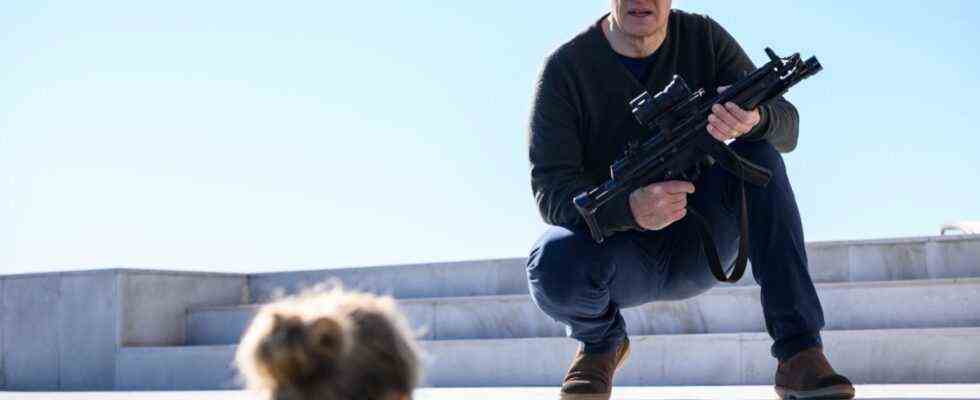For a moment it looks like the self-propelled suitcase is about to plop into the fjord. But it doesn’t happen. He’s smart, he could also take on a supporting role as an android in “Star Wars”, he knows exactly where to go, like a loyal dog always by the side of his master, Johann. He has certainly learned that machines can already do that today. And Johann is appropriately played by Tobias Moretti, probably the best-known master in German-language film history since “Inspector Rex”. This Johann is a journalist and after a critical article about the right-wing populist government that will be in power in Germany in 2029, he is banned from working and has to go into hiding. Fortunately, his partner Lucia (Valery Tscheplanowa) is a wealthy lawyer and owns a chic designer villa on a Swedish island.
In the near future, not only the trolley case, but pretty much everything will be smart: from the autonomous water taxi to the wristwatch to the villa. Everything controls itself or on voice command. Door open, door closed, as if by magic. Practically. Piano music sounds to welcome you. How pleasant. But the spook quickly becomes a bit too much: Once the front door cannot be opened and Johann has to spend the night with Lucia on the beach, next to his first self-kindled campfire. Then the refrigerator orders way too much food. And it gets really scary when the house guides Johann with a beeping sound to the submachine gun in the basement. How does it know it’s there? And why is it hidden there at all? A red machine eye glows in the server room of the house, like the crazy computer HAL from Stanley Kubrick’s “2001”. The hint that the most famous dog master and the most famous killer computer in film history could have been let loose on each other could have been a little more subtle.
The film packs all the big questions of the present into the house in the archipelago
The template for “Das Haus” is a short story by the journalist Dirk Kurbjuweit, and of course he doesn’t have a horror shocker, but rather as a mirrors-Editor in the Berlin capital office wrote a political thriller. The silence in the archipelago villa will soon be over: In addition to the annoying AI spook, two young people, Lucia’s protégé Layla (Lisa Vicari) and her coarse friend Alex (Max von der Groeben) stay for a few days. Do they have something to do with the attack that the news is currently full of?
Ready for everything? Layla (Lisa Vicari) and Alex (Max von der Groeben) want to do some things differently than the older generation.
(Photo: Andreas Schlieter / Not Sold Verleih)
Everyone present has something against the far-right government. As it should be in middle-class circles, positions are exchanged over white wine, dinner and with a view of the fjord. Johann still trusts democracy, Layla and Alex see it differently. If necessary, you want to defend yourself. “If we shoot, we’ll hit the right ones.” “And who decides that? The right people? Do you decide that?” Replies Johann. Killing Hitler would have been okay, too, thinks Layla. After all, the comparison with 1933, which has been suggested several times, is pursued by the film no further than this association.
The film packs all the big questions of the present into the house in the archipelago: the legitimation crisis of democracy, the problems in dealing with artificial intelligence and also a tangible relationship dispute: The house has collected a whole archive of home sex videos and of course is playing exactly the wrong thing away. Lucia, who has to deny large parts of the film naked, is having an affair with Johann’s boss. Oops, was that so smart now? Shouldn’t the house serve the people instead of turning them against each other? The film brings democracy and AI closer together, the house and its problems become a social metaphor.
A smart home as an image for the endangered democracy? Sure, both are ultimately tools that require responsible use by their users, and something is wrong with both. It is true that algorithms, especially in the form of social networks, are doing a lot to destroy our society. And people like Johann generally decide a little too much. With a similar gesture, the cultural scientist Joseph Vogl also diagnosed “the ferment of a new pre-war era” in his current book in the interplay of digital corporations, capital markets and democratic societies. That’s all right, in the film it looks like from watch advertising and as a chamber play, but too constructed and intentional, too sketchy and far from life. The correct observations do not get beyond themselves. Because in the end, democracy is not a trolley case, no matter how smart it is.
The House, D 2021. Director: Rick Ostermann. Book: Patrick Brunken, Rick Ostermann, Dirk Kurbjuweit. Camera: Stefan Ciupek. With: Tobias Moretti, Valery Tscheplanowa, Lisa Vicari. Not Sold rental, 90 minutes.

